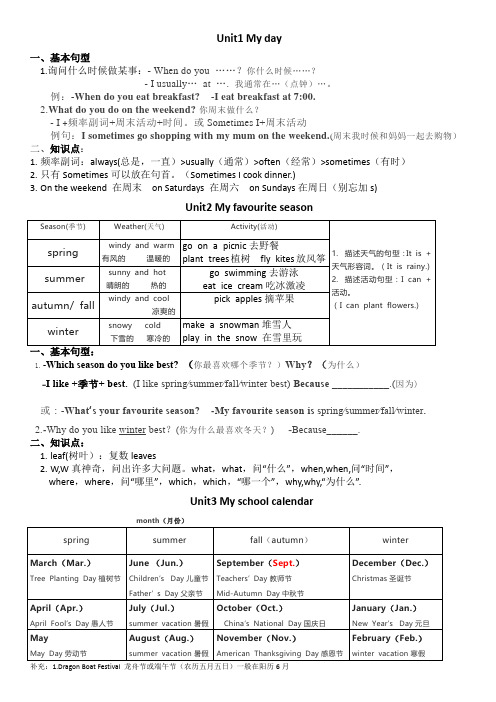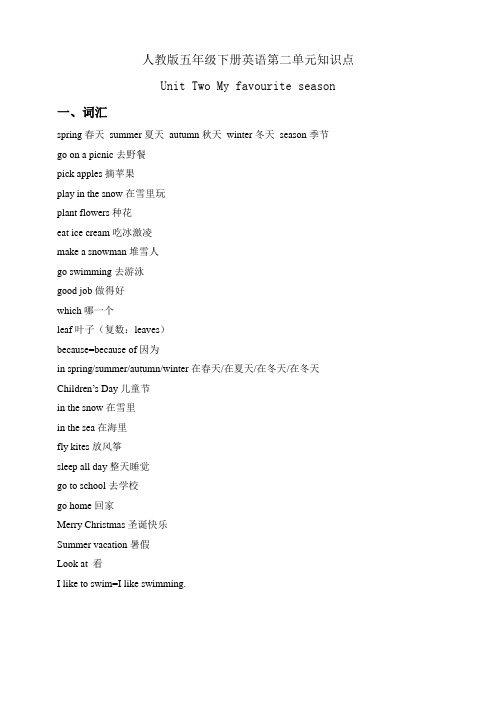小学英语人教PEP五年级下册语法知识点汇总
- 格式:doc
- 大小:63.00 KB
- 文档页数:3

人教版小学PEP英语五年级下册知识点归纳Unit 5 Whose dog is it ?一、重点词汇我你他她它我们你们他们主格I you he she it we you they 宾格me you him her it us you them我的你的他的她的它的我们的你们的他们的形容词性物主代词my your his her its our your their名词性物主代词mine yours his hers its ours yours theirs四会:mine 我的yours 你(们)的his 他的hers她的theirs 他们的;她们的;它们的 ours 我们的climbing(正在)攀登;攀爬eating(正在)吃playing (正在)玩jumping(正在)跳drinking(正在)喝(水) sleeping (正在)睡觉三会:each 每一;各个other 其他each other 相互excited 兴奋的;激动的like 像……那样二、掌握的短语climb trees 爬树play football 踢足球look at 看 a beautiful painting 一幅美丽的画in the kitchen在厨房play with each other一起玩耍drink water 喝水listen to music 听音乐read books读书三、名词性物主代词和形容词性物主代词表示所有关系的代词叫做物主代词,即表示事物主人的代词。
它包括名词性物主代词和形容词性物主代词。
注意:1、形容词性物主代词相当于一个形容词,不能单独使用,后面需要跟名词,常用来修饰、限定后面的名词。
如:This is my book.(这是我的书。
).That is his bag.(那是他的书包。
)2、名词性物主代词需独立使用,后面不能跟名词,它相当于“形容词性物主代词+名词”。
如:It’s mine. (它是我的。

PEP小学英语五年级下册各单元知识重点总结Unit 1: My School- Grammar: Singular and plural nouns, possessive 'sUnit 2: My Family- Vocabulary: mother, father, sister, brother, grandparents- Grammar: The verb 'to be' (am, is, are) to describe family membersUnit 3: Out and About- Vocabulary: park, zoo, museum, supermarket, post office- Grammar: Present continuous tense to talk about actions happening nowUnit 4: Let's Eat!- Vocabulary: breakfast, lunch, dinner, fruit, vegetables- Grammar: Imperative sentences to give instructionsUnit 5: At the Farm- Vocabulary: farmer, barn, cow, pig, chicken- Grammar: There is/There are to talk about existenceUnit 6: Our Town- Vocabulary: street, hospital, police station, fire station, city- Grammar: Prepositions of place (in, on, under, behind, next to)Unit 7: Weather Report- Vocabulary: sunny, cloudy, rainy, snowy, windy- Grammar: Adjectives to describe weatherUnit 8: Fun with Friends- Vocabulary: play, sing, dance, swim, draw- Grammar: Simple present tense to talk about daily activitiesUnit 9: In the Ocean- Vocabulary: fish, dolphin, shark, octopus, seahorse- Grammar: Wh- questions using 'What' and 'Where'Unit 10: Happy Holidays- Vocabulary: Christmas, Easter, Halloween, New Year's Day, Thanksgiving- Grammar: Use of can for ability。

Unit1 My day一、基本句型1.询问什么时候做某事:- When do you ……?你什么时候……?- I usually…at …. 我通常在…(点钟)…。
例:-When do you eat breakfast?-I eat breakfast at 7:00.2.What do you do on the weekend?你周末做什么?- I +频率副词+周末活动+时间。
或Sometimes I+周末活动例句:I sometimes go shopping with my mum on the weekend.(周末我时候和妈妈一起去购物)二、知识点:1.频率副词:always(总是,一直)>usually(通常)>often(经常)>sometimes(有时)2.只有Sometimes可以放在句首。
(Sometimes I cook dinner.)3.On the weekend 在周末on Saturdays 在周六on Sundays在周日(别忘加s)Unit2 My favourite season1.-Which season do you like best? (你最喜欢哪个季节?)Why?(为什么)-I like +季节+ best.(I like spring∕summer∕fall∕winter best) Because ___________.(因为)或:-What‘s your favourite season? -My favourite season is spring∕summer∕fall∕winter.2.-Why do you like winter best?(你为什么最喜欢冬天?) -Because______.二、知识点:1.leaf(树叶):复数leaves2.W,W真神奇,问出许多大问题。
what,what,问“什么”,when,when,问“时间”,where,where,问“哪里”,which,which,“哪一个”,why,why,“为什么”.Unit3 My school calendar补充:1.Dragon Boat Festival 龙舟节或端午节(农历五月五日)一般在阳历6月2.月份首字母大写。


Unit11、询问对方作息时间的句型问:When do you +动词原形+其他答:I/We +动词原形+at+时间eg:—When do you finish class in the morning?—We finish class at 1 o’clock.2、询问对方为什么正在做某事问:Why are you+动词-ing+其他?答:Because ...—Why are shopping today?—Because ...3、询问对方周末做什么的句型问:What do you do on the weekend?答:I/We +频度副词+动词原形+其他eg:—What do you do on the weekend?—I often play football.4、频度副词Always总是usually通常often经常sometimes 有时never从不Unit21、询问对方是否喜欢某事物的句型问:Do you like +名词?答:Yes,I /We do. No, I/We don’t. eg:—Do you like snow?—Yes,I do.2、询问对方喜欢的季节的句型问:Which season do you like best?答:I like +季节+best.eg:—Which season do you like best?—I like summer best.3、询问对方喜欢某季节的原因及答语问:Why (+do you like+季节)?答:Because +原因。
eg:—Why doyou like winter ?—Because I like snow.4、表示某地有某人、某物的句型There +be动词+主语(某人/某物)+其他。
eg:There are two books and a pen on the desk.Unit31、询问某活动、节日日期的句型问:When +be动词+活动/节日?答:It’s in +季节/月份.eg:—When is the party?——It’s in June.主语+will+动词原形(+其他)eg:I will go to the park tomorrow.4、询问某人是否将要做某事的句型问:Will +主语+动词原形(+其他)?答:Yes,主语+will / No,主语+won’t eg:—Will you go shopping?——Yes,I will.Unit41、询问某节日的具体日期的句型问:When is +节日?答:It’s on +某月某日.eg:—When is the art show?——It’s on May 1st.2、询问某人生日的句型问:When is one’s birthday?答:One’s birthday is on +具体日期./It’s on +具体日期. eg:—When is your father’s birthday?——It’s on January 6th.3、询问对方将要为某人做什么的句型问:What will you do for +某人?答:I will +动词原形+其他.eg:—What will you do for your teacher?——I will clean the teachers’ office.1、描述物品归属的句型物品+ be动词(is/are)+(mine/his/hers/yours/ours/theirs) eg:The book is yours.2、确认物品归属地句型问:be动词+this/that/these/those(+其他)+某人的?答:Yes,it is. Yes,they are./ No,it,is’t. No,they aren’t. eg:—Is that crayou his?——Yes,it is.3、询问物品归属的句型问:单数Whose+is it/this/that?复数Whose+are they/these/those?答:It’s/They’re+名词性物主代词/ 名词所有格eg:—Whose bag is this?——It’s mine.4、现在进行时的一般疑问句问:Be动词+主语+动词-ing(+其他)?答:Yes,主语+be动词/ No,主语+be动词+not. eg:—Is she listening to music?——Yes,she is.5、描述某人正在做某事主语+be动词(am/is/are)+动词-ing(+其他).eg:I’m doing my homework now.6、询问某人能否做某事问:Can+主语+动词原形+其他?答:Yes,主语+can. /No,主语+can’t.eg:—Can I play football?——Yes,you can.Unit61、询问多个人或动物正在做什么的句型问:What are +主语(复数)+doing?答:主语(复数)+are+动词-ing+其他.eg:—What are the boys doing?——They are jumping2、询问单个人或动物正在做什么的句型问:What is +主语(单数)+doing?答:主语(单数)+is+动词-ing+其他.eg:—What is Tom doing?——He is playing football.。


Unit 1知识梳理【重点单词】1.exercise 活动;运动2.take 学习;上(课)3.dancing 跳舞;舞蹈4.when 什么时候;何时5.after 在(时间)后6.start 开始ually 通常地;惯常地te 晚;迟9.a.m. 午前;上午10.p.m. 午后;下午11.why 为什么12.busy 忙的13.always 总是;一直【重点词组】1.eat breakfast 吃早饭2.have … class 上……课3.play sports 进行体育运动4.do morning exercises 做早操5.eat dinner 吃晚饭6.clean my room 打扫我的房间7.go for a walk 散步8.go shopping 去买东西;购物9.take a dancing class 上舞蹈课【重点句子】1.I get up at 5 o’clock.我五点钟起床。
2.That sounds like a lot of fun.听起来很有趣。
3.I usually wash my clothes.我通常洗我的衣服。
4.Sometimes I cook dinner.有时候我做晚饭。
5.I often go shopping.我经常去购物。
【重点对话】1.—When do you finish class in the morning? 你们上午的课到几点结束? —We finish class at 1 o’clock.我们一点钟结束上午的课。
2.—When do you eat dinner? 你几点钟吃晚饭?—At 6:00 p.m.下午六点钟。
3.—What do you do on the weekend ? 你周末做什么?—I often watch TV and play ping-pong with my father.我经常看电视,也常和我爸爸一起打乒乓球。

人教版PEP小学英语五年级下册知识点汇总(最新)Unit One: This Is My DayBasic Vocabulary:Activities: get up。
do morning exercises。
have English class。
play sports。
play the piano。
climb mountains。
go shopping。
go hiking。
visit grandparents。
eat breakfast。
eat dinner.Basic XXX Structures:1.Asking about daily routines:When do you。
(你什么时候。
)XXX I。
(我通常在。
(点钟)。
(做什么事)。
有时。
)XXX: When do you go to school。
(你每天几点去上学?)I usually go to school at 7:00.Sometimes I go to school at7:10.2.Asking about XXX:What do you do on the weekend。
(你周末做什么?)XXX I。
(我通常/经常。
有时。
)XXX: What do you do on the weekend?I often play XXX I go shopping with my mom.3.Introducing one's own habits:Every weekend。
I go hiking。
(我每个周末远足。
)Every day。
I do my homework at 8:00 in the evening。
(我每天晚上8点做作业。
)4.Asking XXX:What do you do。
(你是干什么的?)Time:morning。
afternoon。
evening。
noon。
at night。
6:00.on Sunday。

PEP小学五年级英语下册Unit 1 My day 知识清单【句型/语法知识点】一. 频度副词(放主语之后)。
always总是(100%); usually通常(80%); often 经常(60%);sometimes有时(30%);never从不(0%)二. 重点句型。
1. 询问别人什么时候做某事的句型及回答。
句型结构:问:When +助动词do/does + 主语(非三单/三单)+ 动原+ 其他?答:①主语(非三单)+(频度副词)+动原+ at + 时间点.例:问:When do you go to bed?答:I go to bed at 9:00p.m答:②主语(三单)+(频度副词)+动词三单形式(动词s/es)+ at + 时间点.例:问:When does Amy go to bed?答:She goes to bed at 9:00 p.m.2. 询问别人周末做什么的句型及回答。
句型结构:问:What +助动词do/does + 主语(非三单/三单)+ do + on the weekend?答:①主语(非三单)+(频度副词)+动原.例:问:What do you do on the weekend?答:I usually read books.答:②主语(三单)+(频度副词)+动词三单形式(即动词s/es).例:问:What does Amy do on the weekend?答:She often goes shopping with her mother .三.句型转换:1.肯定句↔一般疑问句:I usually get up at 6:00. ↔ Do you usually get up at 6:00?肯定回答:Yes, I do. 否定回答:No, I don’t.(第三人称时) He eats dinner at 6:00p.m. ↔ Does he eat dinner at 6:00p.m.?肯定回答:Yes, he does. 否定回答:No, he doesn’t.2.肯定句↔否定句:I like playing the piano. ↔ I don’t like playin g the piano.I can play the piano. ↔ I can’t play the piano.3.划线提问:⑴ I often go shopping on the weekend. → When do you go shopping ?⑵ I often go shopping on the weekend. → What do you do on the weekend?⑶ I go to school at 7:00. → When do you go to school?四. 语音:cl /kl/ clean clock class clever pl /pl / plate eggplant please playPEP小学五年级英语下册Unit 2 My favourite season 知识清单【四会单词】【重点句型】【句型/语法知识点】一. 重点句型1. 询问别人天气怎么样的句型及回答。

PEP小学五年级英语下册语法讲解语法是英语的灵魂,是把单词串联起来的一条线。
小编在这里整理了相关知识,快乐看看吧!PEP小学五年级英语下册语法讲解现在进行时一.意义——当表示现在正在进行的动作或正在发生的事。
二.构成:be (am, is ,are )+动词现在分词-ing形式标志性词语:1.现在进行时.通常用“now”.eg: I am doing my homework now.2.现在进行时.通常用“look”.eg: Look! My mother is running3.现在进行时.通常用“listen”.eg: Listen! They are reading.4.现在进行时.通常用“at the (this) moment”eg: At the (this) moment, he is only weeping.三、现在进行时的句型变化• 肯定式结构:主语+be+动词-ing形式+其他.例如:We are running now.• 否定式结构:主语+be+not+动词-ing形式+其他.例如:They aren’t doing their homework.• 一般疑问句式结构:Be+主语+动词-ing形式+其他?例如:Is she having English lesson?回答:肯定Yes, she is. 否定:No, she isn’t.• 特殊疑问句式结构:疑问词+be+主语+其他?例如:What is he doing now?回答:He is swimming.四. 现在分词的构成:(1)一般在动词末尾直接加ing,1 一般情况下直接加ingthink---thinking sleep---sleeping study---studying speak---speaking say---saying(2)以不发音字母e结尾的动词,先去掉e,再加ing,如skate →skating make →making dance → dancing write → writing have→ having ride → riding come → coming(3)以重读闭音节结尾的动词,中间只有一个元音字母,词尾只有一个辅音字母,应双写末尾的辅音字母,再加ing, 如:putting running beginning stopping swimming shopping jogging sitting getting forgetting letting(4)以ie结尾的动词,把ie改为y ,再加ingdie---dying lie---lying五、现在进行时的用法(1)用来表示说话时正在进行或者发生的动作,例如:Mother is cooking in the kitchen.妈妈在厨房里煮饭。

pep五年级英语语法知识点归纳
PEP五年级英语语法知识点归纳
一、一般现在时
1. 定义:表示经常发生的动作或存在的状态。
2. 构成:动词原形(主语为第三人称单数时,动词后面加-s或-es)
3. 常用时间状语:always, usually, often, sometimes, every day等。
二、现在进行时
1. 定义:表示正在进行的动作。
2. 构成:be动词(am/is/are)+动词的ing形式
3. 常用时间状语:now, at the moment等。
三、一般将来时
1. 定义:表示将来要发生的动作或存在的状态。
2. 构成:will+动词原形
3. 常用时间状语:tomorrow, next week, in the future等。
四、一般过去时
1. 定义:表示过去的动作或存在的状态。
2. 构成:动词的过去式
3. 常用时间状语:yesterday, last week, three years ago等。
五、形容词的比较级和最高级
1. 比较级:表示“更……”,形容词后面加-er。
形容词比较级前可以用more修饰。
2. 最高级:表示“最……”,形容词后面加-est。
形容词最高级前通常用the修饰,前面加most修饰。
3. 表示倍数关系的比较级:be twice the size of…(是……的两倍大)等。

五年级下册英语语法知识点语法知识1.近义词eat breakfast—have breakfast eat lunch—have lunch eat dinner —have dinnerplay sports—do sports usually—often复数形式:policeman—policemen policewoman—policewomen 现在分词:tell—telling三单:say—says同义句:What do you do?---What are you?你是干什么的?2、频度的副词:always总是,一直usually通常,常常often经常sometimes有时候4、介词后跟表示时间的词语时,表示在某年、某月、某个季节,某个时候(在上午,在下午,在晚上)用in;表示在某一天,在星期几用on,在具体的几点几分用at.5、too和either的用法区别:too和either都是“也”的意思,但too用于肯定句,either用于否定句。
第二单元语法知识1.同义词:aut umn(英)—fall(美)对应词:wake up—sleep go t o bed—ge t up2.三单:say—says ask—asks co me—comes3.同义句:What’s your favourite season?(你最喜爱的季节是什( 么?)----Which season do you like best?(你最哪个季节?)4.表示天气的介词。
当表示某地某个季节的天气情况时,要把季节放在前面,地点放在后面。
其结构为:What ’s the weather like in季节 in 地点?第三单元主要语法点:1、关于月份:(1)五月 May , 六月 June, 七月 July ,没有简写 形式。
九月 September 的简写形式是前四个字母加点 Sept. 其他八个月的简写形式是前三个字母加点。

人教版五年级下册英语第二单元知识点Unit Two My favourite season 一、词汇spring春天summer夏天autumn秋天winter冬天season季节go on a picnic去野餐pick apples摘苹果play in the snow在雪里玩plant flowers种花eat ice cream吃冰激凌make a snowman堆雪人go swimming去游泳good job做得好which哪一个leaf叶子(复数:leaves)because=because of因为in spring/summer/autumn/winter在春天/在夏天/在冬天/在冬天Children’s Day儿童节in the snow在雪里in the sea在海里fly kites放风筝sleep all day整天睡觉go to school去学校go home回家Merry Christmas圣诞快乐Summer vacation暑假Look at 看I like to swim=I like swimming.二、语法(一)Which引导的特殊疑问句,就最喜欢的季节是哪一个进行提问Which season do you like best?回答:I like+季节+best.或者I like+季节.或者直接说季节名称。
拓展:What is your favourite season?回答: My favourite season is+季节.季节+is my favourite season.(二)What引导的特殊疑问句,就天气进行提问What is the weather like today?回答:It is......(三)What引导的特殊疑问句,就在某一个季节做某事进行提问What do you often do in +季节?回答:I often+具体的事情.三、重要句子Which season do you like best?I like spring best.Why do you like autumn best?Because the colours are pretty.There are beautiful flowers everywhere.I can sleep all day.How about you?=What bout you?I like summer best.because of Children’s Day.Look at my picture.The weather is good and the colours are beautiful.There is lots of snow.I want to paint a picture ,too.What is your favourite season?My favourite season is spring四、语音(辅音字母组合发音)①br发音为/br/br own li br ary br other um br ella br eakfast②gr发音为/gr/gr een gr apes gr andpa gr ow gr ass gr eat五、拓展①Why和because的用法Why 引导询问原因的特殊疑问句。

PEP英语五年级下册Unit 1词汇1. do morning exercises(晨练)2. eat breakfast (吃早饭)3. have English class (上英语课)4. play sports (进行体育活动)5. eat dinner (吃晚饭)6. when (什么时候)7. about (关于;大约8. policeman (警察)9. work (工作)10. evening (夜晚;晚上)11. get up (起床)12. at (在……点钟)13. usually (通常;一般)14. noon (中午)15. tell (告诉)16. climb mountains (爬山)17. go shopping (购物;买东西)18. play the piano (弹钢琴)19. visit grandparents (看望[外]祖父母)20. go hiking (去远足)21. weekend (周末)22. ofen (经常)23. sometimes (有时候)24. rain (下雨)25. either (也)26. next (下一个)Unit 1 重点句型讲解1.When do you get up?你什么时候起床? get up 起床2.What do you do on the weekend?周末你做什么?weekend= Saturday and Sunday 周末3.This is my weekend timetable.这是我的周末日程表。
4.When do you play sports?你何时进行体育活动? when 什么时候5.Tell us about your day!告诉我们关于你的日子。
6.Which is Mike’s timetable?哪一个是迈克的日程表?7.Excuse me. Can I ask you some questions? Sure.打扰一下,我可以问你一些问题吗?当然。

人教版英语五年级下册知识点总结一、词汇核心词汇学校生活:classroom, library, playground, office, restroom, schedule, lesson, homework, break, lunch家庭成员:family, father, mother, brother, sister, uncle, aunt, cousin日常活动:get up, go to bed, wash face, brush teeth, eat breakfast, do homework, watch TV, play computer games 食物与饮料:hamburger, hot dog, sandwich, pizza, cake, cookie, milk, juice, water拓展词汇学科名称:math, science, Chinese, English, PE, art, music 颜色与衣物:red, blue, yellow, green, white, black, shirt, pants, shoes, hat, socks动物与植物:cat, dog, fish, bird, rabbit, flower, tree, grass, leaf节假日与活动:birthday, Christmas, Spring Festival, summer vacation, winter vacation, party, picnic二、语法现在进行时表达正在进行的动作或状态。
be动词(am/is/are)+动词-ing形式。
例句:What are you doing? I am reading a book. They are playing football.一般现在时表达经常性的行为或状态。
主语为第三人称单数时,动词形式要发生改变。
例句:She always washes her hands before meals. He often watches TV in the evening.一般过去时表达过去某个时间发生的动作或状态。

人教版小学PEP英语五年级下册知识点归纳PEP五年级英语下册各单元知识点Unit 1 My day一、重点词汇。
1.四会词汇:eat breakfast 吃早饭 have···class 上······课play sports 进行体育运动exercise 活动;运动 domorning exercises做早操eat dinner吃晚饭clean my room 打扫我的房间go shopping 去买东西;购物go for a walk 散步take学习;上(课) dancing跳舞;舞蹈 take a dancing class 上舞蹈课2. 三会词汇:when什么时候after 在(时间)后start 开始usually 通常地;惯常地Spain 西班牙late 晚;迟 a.m. 午前;上午 p.m. 午后;下午why 为什么shop 去买东西;购物work 工作last 上一个的;刚过去的sound 听起来好像also 还;也busy 忙的 need 需要play 戏剧;剧本letter 信live 居住island 岛always 总是;一直cave 山洞;洞穴go swimming 去游泳 win 获胜二、其他日常活动。
get up起床 eat lunch吃午饭 go to bed 上床睡觉wash my face洗脸 wash my clothes 洗我的衣服 watch TV看电视play ping-pong打乒乓球 playthe pipa弹琵琶 go swimming去游泳go running去跑步 do homework 做作业 do kung fu练武术play football踢足球 play basketball打篮球三、频度副词。
always总是,一直(100%) usually通常(80%)often 经常(60%) sometimes(30%)有时四、疑问词。
五年级英语下册语法知识点汇总
一、词类
1、名词
这里强调两点:不可数名词都默认为单数,所以总是用is
名词复数如何加后缀:
2、人称代词和物主代词、
人称代词:有主格和宾格之分。
一般动词前用主格,动词后用宾格。
3、指示代词
4、冠词
有a、an、the。
a和an的区别:an用于元音音素(一般就是元音字母a、e、i、o、u)前,a用于辅音音素前。
二、否定句
be动词(am、is、are)+not、情态动词can+ not、助动词(do、does) + not
如何将一个肯定的陈述句改为否定句:
1、看句中有无be动词,如有,直接在be动词后+ not。
2、看句中有无情态动词,如有,直接在情态动词后+ not。
3、如上述二者都没有,就应用助动词+ not。
分四个步骤:
(1)肯定陈述句中本来是没有助动词的,要加上去,位置在主语(某人或某物)后,动词前。
(2)确定助动词用do、does,根据句中动词,动词是原形的助动词就用do,动词是第三人称单数的助动词就用does,
(3)在助动词后加not。
(4)原句中动词假如发生变化就要恢复成原形。
强调一点,有some的要考虑是否要用any。
三、一般疑问句
如何将一个肯定的陈述句改为一般疑问句:
1、看句中有无be动词,如有,把be动词提到句首即可。
2、看句中有无情态动词,如有,把情态动词提到句首即可。
3、如上述二者都没有,就应把助动提到句首。
分四个步骤:
(1)肯定陈述句中本来是没有助动词的,要加上去,位置在主语(某人或某物)后,动词前。
(2)确定助动词用do还是does,根据句中动词,动词是原形的助动词就用do,动词是第三人称单数的助动词就用does
(3)把助动词后提到句首。
(4)原句中动词假如发生变化就要恢复成原形。
强调一点,有some的要考虑是否要用any。
四、特殊疑问句
表示疑问,有疑问词(在开头),回答有很多种可能。
常用疑问词:
五、时态
1、一般现在时
(1)一般现在时中的be动词:
一般用原形:am is are
am用于第一人称单数(I);is用于第三人称单数(he she it和其他人名或称谓,如:Ben his sister等);are用于第二人称单数(you)和所有复数(包括第一人称复数we、第二人称复数you;第三人称复数they和其他复数,如the
(2)一般现在时中的动词:
第一种情况:主语是第三人称单数(he she it 和其他,如Helen 、her cousin 等),动词后一般加s或es。
第二种情况:主语不是第三人称单数,动词都用原形。
(3)一般现在时判断依据(如何判断一个句子是一般现在时):
△be动词是am、is、are △动词用原形或加s、es
△没有时间状语或有usually、often、everyday、sometimes等不是具体的时间
2、现在进行时
(1)构成形式:Be动词+动词的ing形式
这里强调一点,两者缺少其中任何一种都不可以构成现在进行时。
(2)现在进行时表示动作正在进行或事情正在发生。
(3)有用的依据:一个句子中既有be动词,又有动词,且动词加了ing ←→该句是现在进行时
(4)句中往往有now、look、listen等词。
动词现在分词的变化见下表:
▣同音词:
too---two----to buy---by I---eye four----for
there----their right----write sun----son no----know
here---hear who’s----whose
▣近义词:
many----a lot of / lots of large----big desk----table
photo---picture lamp----light like----love
▣反义词或对应词:
old----new go----come big----small
open----close black----white here----there
▣完整形式:
let’s=let us(让我们) I’d=I would can’t=can not I’m=I am
▣词性变换:
one(序数词) first monkey(复数)monkeys skiing(原形)ski
is(复数)are families(单数)family make(现在分词)making we are(缩略形式)we’re do(第三人称单数)does have(第三人称单数)has photo(复数)photos fat(反义词)thin
★做题目时一定要记住:
1.can+动词原形
2.like+动词ing
3.like+名词复数
4.play+足球类play the +乐器类
5.how many +名词复数
6.would like +to+动词原形
7.let's+动词原形
8.现在进行时:be(am,is,are)+动词ing 9.动词第三人称单数形式。